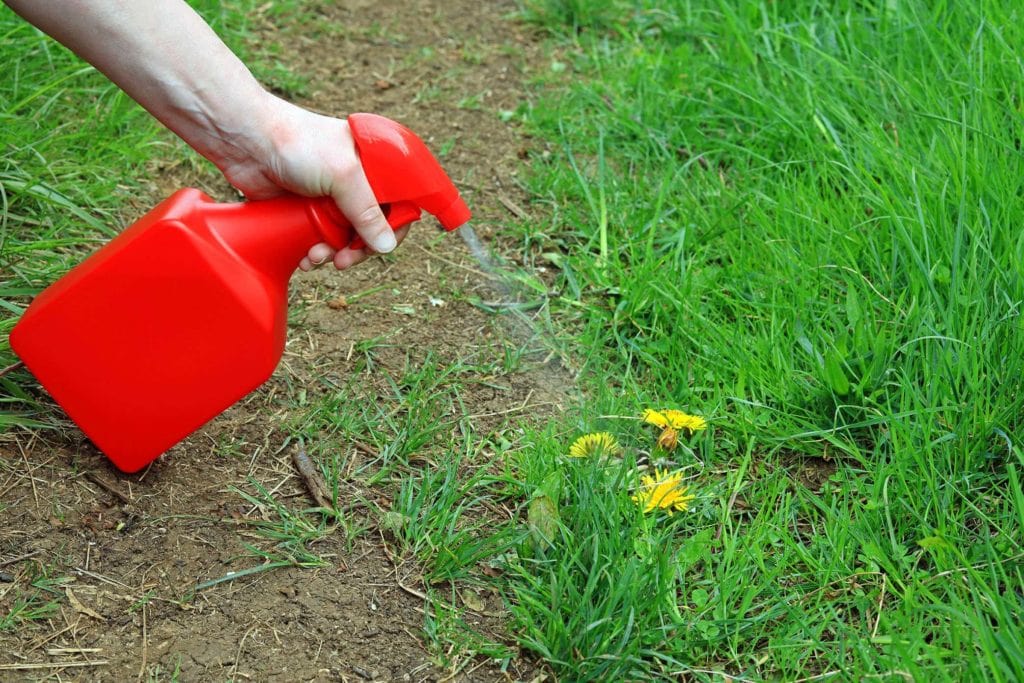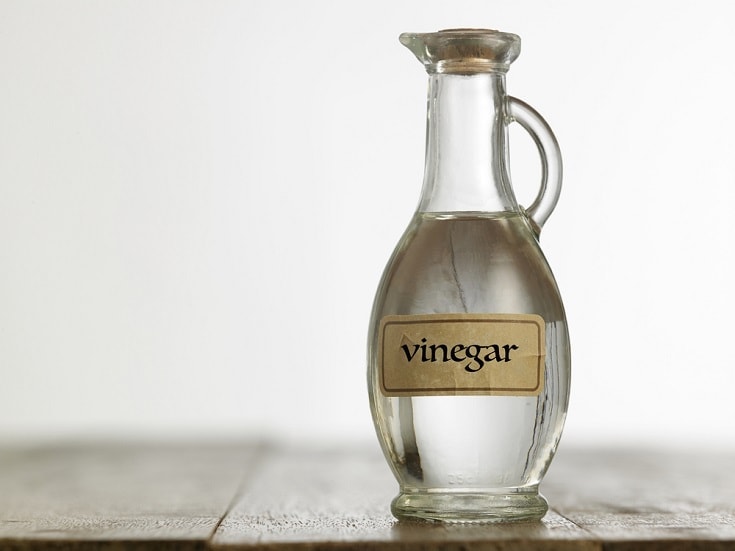How to Make Natural Weed Killer With Vinegar – Easy Guide
-
Pete Ortiz
- Last updated:

Vinegar is more than just a delicious dressing for your salad. Gardening-grade vinegar can be used to create an affordable and natural weed killer that you can make in seconds. In fact, some studies have even shown that vinegar is just as effective at combatting weeds as over-the-counter herbicides, which are packed with harmful chemicals.
Of course, tossing some Heinz vinegar on your garden is not a smart decision. You need to know how vinegar works and how to make a powerful concoction that produces the best weed-killing results. Without any more introduction, let’s talk about why vinegar works as a weed killer and how to make the best recipe.
Why Vinegar?
To many people, the fact that you can both eat vinegar and use it to kill weeds is slightly alarming. Nevertheless, people have been using vinegar for a variety of reasons for centuries. Even your grandparents may have used vinegar in their garden for weed-killing purposes.

What is Vinegar?
Even though vinegar has a harsher taste than most wines, wine and vinegar are made through the same process. Vinegar is made by fermenting grain, apples, grapes, or anything else with ethanol. The name vinegar even reflects its similarity to wine. Vinegar is comprised of two Latin words, one meaning “wine” and the other meaning “sour.” So, vinegar literally means sour wine.
The vinegar that you put on your salad, even though it may be too sour for some people, is actually not full-strength vinegar. The type of vinegar you eat tends to only have 5% acetic acid. In contrast, full strength vinegar is made from acetic acid and water alone. Anything over 11% in acetic acid is considered hazardous and not safe for consumption.
For a vinegar to effectively kill weeds, it needs to have a 20% acidic level. Obviously, this sort of vinegar is way too potent to consume or ingest in any way, not that anyone would want to in the first place. Though vinegar with this acidity will kill weeds, it is still considered a low-toxic option in comparison to other commercial weed killers.
Why Does It Work as an Herbicide?
How vinegar works as an herbicide is that it has a drying effect. Acetic acid, which we have already discussed as being what makes vinegar acidic, is considered a desiccant. That is just a fancy word for a chemical that pulls moisture. As the acid pulls the moisture from the plants, they slowly die.
Vinegar works as a non-selective herbicide. What this means is that the vinegar will kill more than just weeds if you are not careful. When applying vinegar as a weed killer, you must apply it so that it is most targeted to the weeds and not your desired plants.
Unlike other herbicides, vinegar only contacts the leaves. It does not penetrate all the way down to the root. As a result, it takes longer for vinegar to kill weeds, and you will likely need to reapply the vinegar several times.
Reapplication is Often Necessary
Though reapplying the solution may be slightly annoying, it also is helpful due to the non-selective feature of vinegar. You don’t have to worry about killing your other plants if you accidentally squirt too much in one direction. One exposure isn’t enough to kill most plants.
Tips for Using an Herbicide
In addition to being careful to avoid spraying your desired plants with vinegar, you also need to make sure that you avoid spraying anything that can be stained or corroded. This includes fences, furniture, and masonry. Given that vinegar is corrosive, it can damage these things.
Since vinegar takes more time to kill the weeds, it works best on small and newly germinated weeds. However, vinegar may not be powerful enough to take down a large weed that you’ve been trying to kill for months.
Additionally, plants with hairy or waxy surfaces will struggle to absorb the vinegar, making it more difficult to kill these weeds as well. Mixing liquid dish soap or orange oil with the vinegar can help it stay on the plant so that it actually kills the weed.
Pros and Cons
Just like with any other herbicide or product, vinegar weed killer comes with pros and cons. It is up to you to weigh them against each other and decide which option is right for you.
Pros
Most people are in favor of vinegar weed killer because it is a natural and organic alternative to other over the counter weed killers. Even though vinegar can kill plants, it breaks down rapidly and has low toxicity levels. What this means is that vinegar weed killer is better for the environment as a whole, and you don’t have to worry about your children or animals dying from exposure to it.
Another benefit of this weed killer is its affordability. As you probably know, vinegar is really cheap. On top of that, a little bit goes a long way. One gallon of vinegar can cover around 1000 square feet in your garden. These facts make vinegar weed killer a more affordable option than other weed killers.

Cons
Despite the positives of vinegar weed killer, it comes with some drawbacks too. Most notably, it is non-selective and corrosive. This means that you run the risk of killing your other plants or ruining masonry if you use vinegar.
Another drawback is that it is not as powerful as most traditional weed killers. As a result, it takes longer to see results and is not capable of killing large weeds. This is really only a great option if you have small weeds that you kill early on.
Our Take
Looking at these pros and cons, vinegar weed killer is the ideal option if you want an affordable and eco-friendly weed killer. Just make sure that you are careful when applying the weed killer since it is non-selective. However, you might want to look for other alternatives if you have large weeds that vinegar probably won’t be able to handle.
How to Make Vinegar Weed Killer
Now that you have learned about vinegar as an herbicide, let’s get to the weed killing recipe:
- 1 gallon vinegar, 11-20% concentration (20% for maximum results)
- 1 cup table salt
- 1 tablespoon liquid dish soap
- Spray bottle
As we’ve already discussed, vinegar draws moisture out of the plant so that it slowly kills the weed. Salt only maximizes this effect. Salt sucks moisture as well, meaning that the solution will be able to dry out the plants in less time. Meanwhile, the dish soap prevents the solution from slipping off the plant, allowing the solution to do its job.
Just as you should be careful with the vinegar, you also need to be careful with salt. Salt can be dangerous to your soil and will deplete nutrients, making it more difficult for plants to grow at all. So long as you concentrate this solution on the leaves of the weeds, your garden’s soil should be safe.
Directions
Mix all of the ingredients in a spray bottle so that the salt dissolves completely. Do not dilute the solution with water because it will make the weed killer less effective. Making this solution should take no more than a few minutes, if not seconds, to complete.
Since vinegar is corrosive, it is best to use the solution immediately. However, you can store the solution in a cool dry area.
How to Use Vinegar Week Killer Safely
Too much of anything is bad for us. The same goes for vinegar. Similarly, all chemicals, even natural ones, can be dangerous, and you must take safety precautions. The following are key safety precautions to take when working with vinegar weed killer:
- Wear protective gear like long sleeves, pants, goggles, and gloves.
- Keep pets and children away from the solution and affected area until the vinegar weed killer has dried.
- Do not spray the vinegar solution on windy days to protect yourself and surrounding plants.
- Apply the solution no more than once every two weeks.
Other Considerations
Here are some other considerations to keep in mind to use this solution safely and effectively:
-
For Best Results:
- Use the solution on warm and sunny days, especially days that are over 70 degrees Fahrenheit.
- Make sure to wait 24 to 48 hours after a storm to spray the vinegar.
-
Avoid:
- Do not allow the solution to soak into the soil. The vinegar and salt will affect the minerals, microorganisms, and pH of the soil, making the soil less fertile.
- Do not spray the soil if rain is forecasted over the next 24 hours.
- Do not use Epsom salt or rock salt in place of table salt.
-
Upkeep:
- Once sprayed, the solution will last only 72 hours. This means that there is no residual action over the area, allowing new weeds to grow.
- Clean spray bottle well when finished so as to prevent the vinegar from corroding the bottle.
- Store any extra solution in a non-corrosive, heavy-duty container.
Conclusion
Making your own vinegar weed killer can give you a more affordable and environmentally-friendly option than commercial solutions. Unlike other weed killers, vinegar has low toxicity levels and does not stick around in the ground very long. That is why vinegar has been a favorite for weed killing for centuries.
Still, vinegar weed killer is potent and has the potential to be dangerous. So long as you take the proper precautions and understand how vinegar works, you should have little issues using this solution to bust through those pesky weeds.
Featured Image Credit: Dean Clarke, Shutterstock
Contents




